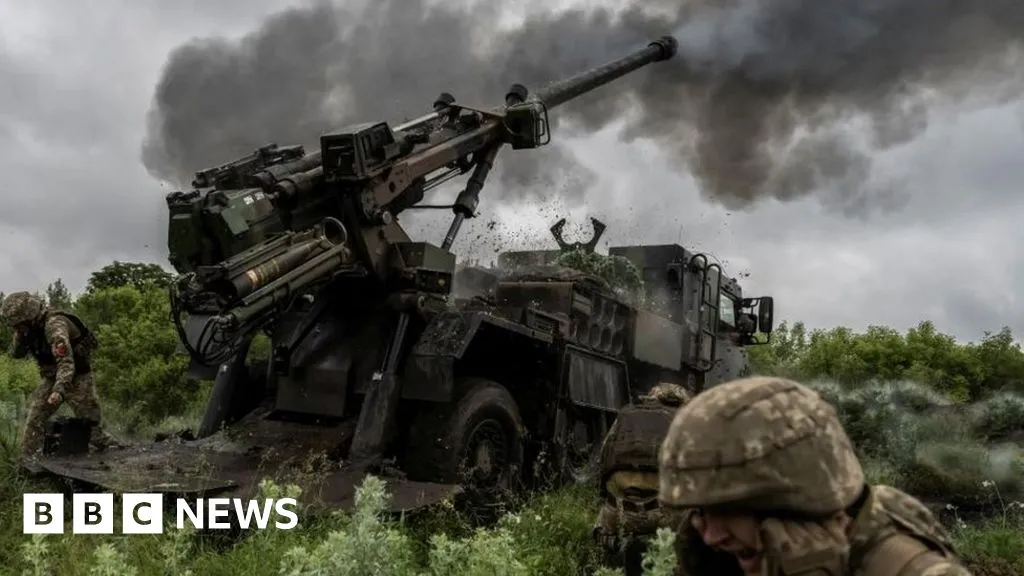- cross-posted to:
- [email protected]
- cross-posted to:
- [email protected]
The White House has confirmed that Ukraine is using US cluster bombs against Russian forces in the country.
National Security Spokesman John Kirby said initial feedback suggested they were being used “effectively” on Russian defensive positions and operations.
Cluster bombs scatter multiple bomblets and are banned by more than 100 states due to their threat to civilians.
The US agreed to supply them to boost Ukrainian ammunition supplies.
Ukraine has promised the bombs will only be used to dislodge concentrations of Russian enemy soldiers.
“They are using them appropriately,” Mr Kirby said. “They’re using them effectively and they are actually having an impact on Russia’s defensive formations and Russia’s defensive manoeuvring. I think I can leave it at that.”
The US decided to send cluster bombs after Ukraine warned that it was running out of ammunition during its summer counter-offensive, which has been slower and more costly than many had hoped.
President Joe Biden called the decision “very difficult”, while its allies the UK, Canada, New Zealand and Spain opposed their use.
The vast majority sent are artillery shells with a lower than 2.35% “dud rate”, a reference to the percentage of bomblets which do not explode immediately and can remain a threat for years.
The weapons are effective when used against troops in trenches and fortified positions, as they render large areas too dangerous to move around in until cleared.
Russia has used similar cluster bombs in Ukraine since it launched its full-scale invasion last year, including in civilian areas.
Reacting to the US decision to send the bombs, Russian President Vladimir Putin said his country had similar weapons and they would be used “if they are used against us”.
Oleksandr Syrskyi, the Ukrainian general in charge of operations in the country’s east, told the BBC last week that his forces needed the weapons to “inflict maximum damage on enemy infantry”.
“We’d like to get very fast results, but in reality it’s practically impossible. The more infantry who die here, the more their relatives back in Russia will ask their government ‘why?’”
He added however that cluster bombs would not “solve all our problems”.
He also acknowledged that their use was controversial, but added: “If the Russians didn’t use them, perhaps conscience would not allow us to do it too.”



We are a party. We are supplying weapons now that are going to kill Ukrainian civilians for years after the war ends. That’s what cluster bombs do.
I fully support Ukraine’s defense. That means exercising some judgement over what we contribute to. So many atrocities have been committed in our name. Iraq, Yemen, Afghanistan, Israel, Nicaragua, Iran… We need to put some lid on how many innocent kids are worth the hypothetical gains we’re expecting to get.
When this ends – it will one day end – I hope Ukrainians get a satisfactory deal. However I must ask:
It’s been said – often in bad faith – that eastern Ukraine is Russian-sympathetic. That a major faction may actually prefer Russian rule. I find this disgusting, but if it turns out to be true, are we prepared to follow their wishes? Or do we disregard that because it conflicts with our preferences?
If Russia keeps the current territory, are you prepared to contend with all the deaths that occur between now and then? If the deaths and trauma DON’T yield gains, will you say, ‘My god… Andrew as right. I insisted that more blood would yield a worthwhile gain and it didn’t. That blood was split for nothing.’
I think war is fucking hell, and I don’t think people are applying any judgement to their anger.
Personally, I think you have a very bad faith argument in believing that your argument holds more weight than the entire government and military organization of the country of Ukraine. It’s their decision to make, not yours. They have to live with the consequences, not you or me.
And arguing that Russia may permanently acquire land in Ukraine that they have invaded a year ago is completely illegal under international law.